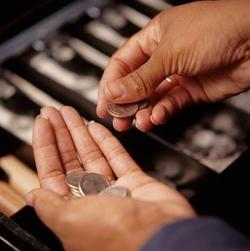|
Assist us mercifully with thy help, O Lord God of our salvation, that we may enter with joy upon the contemplation of those mighty acts, whereby thou hast given us life and immortality, through Jesus Christ our Lord. We step this morning into the heart of the Christian mystery. It may have felt like little more than climbing a few stairs in the ambulatory while trying to figure out what you were supposed to be doing with your palm. But whatever it felt like, what we were really doing was stepping into the heart of the Christian mystery. In ancient days, that mystery used to focus all on one night. It must have been incredibly intense then, like light put through a magnifying glass until it burns. In the first few centuries after Jesus, the night between Holy Saturday and Easter Sunday was the center of the whole year. It exercised a gravitational pull so strong that our entire calendar grew up around it. It drew to itself Baptism of new converts and reconciliation of the penitent. It drew to itself all our core stories, from the creation of the world to the passion of Christ; from the Red Sea to the Resurrection. And everyone who called themselves Christian kept vigil together on that holy night which seemed to have so much power. It still does have that kind of power, and you will see it for yourself if you join us at the Great Vigil of Easter later this week. If you wait, with us, in a difficult darkness that communicates in a way no words can what Jesus has delivered us from, and then move with us, slowly, through the history of the human race to arrive, finally, at vows and bells and Easter hymns and shouts of resurrection. That Vigil we keep together still has immense power. But as the Church matured and its calendar developed in the 4th and 5th centuries, the acts by which God has given us life and immortality came to spread out across more than just that one great night. That single light, that new fire which had been so focused and intense, was put through a prism and revealed a whole spectrum of colors. The Crucifixion and burial of Christ gravitated to Good Friday. The institution of the Eucharist and the ceremony of footwashing gravitated to Maundy Thursday. And today, Palm Sunday, came to be the day given first to Jesus' entry into Jerusalem and then later to the reading of the Passion Gospel.  So, whether it's focused on one night as it used to be, or spread as it is now over the holy week that begins today: when we stepped into the procession this morning, we were stepping into the heart of the Christian mystery. That's why we prayed for help before we did it. Assist us mercifully with thy help, O Lord God of our salvation, that we may enter with joy upon the contemplation of those mighty acts, whereby thou hast given us life and immortality. "The contemplation of those mighty acts." That phrase gives us a hint as to what the Church is not doing in its worship this week. We are not reenacting anything. We are not putting on a show about how it was back in Bible days. That would be theatre, not liturgy; and though theatre is a wonderful thing, it is not what worship is for. Something else the Church is not doing in its worship this week: we are not providing uplifting information or material to use for theorizing. We are not "explaining." That would be education, not liturgy; and though education is a wonderful thing, it is not what worship is for either. Both of those things -- theatrical reenactments and personal education -- are good. But in his work, in his liturgy, here in the heart of his mystery, God promises us much more than that. He promises what our opening prayer this morning is talking about when it says "the contemplation of those mighty acts." Contemplation doesn't mean thinking about concepts. It comes from the same word as temple -- dwelling, tabernacle -- and in the tradition of Christian spirituality it means simply dwelling with or being totally present to. We spent an evening on this in our Lenten program here. When you hear people called contemplatives, it doesn't mean that they sit around mulling ideas over, it means that in their prayer they are simply, directly present to God. Christians call that experience contemplation. So if we enter upon the contemplation of the mighty acts whereby God has given us life and immortality, what that means is that through the power of the liturgies we will share this week, we can become totally present to those acts of God. The door to them is open. Whether or not any of us are natural contemplatives, in Holy Week the liturgy does all the work for us, if we let it. God’s acts that have saved us come to dwell with us this week. Not ideas about them, not reenactments of them, but the acts themselves. Everything that they are, everything that they accomplish, all their transformative energy, is available now. We are standing in the place of redemption. Jesus is here. The road to Jerusalem is here. Golgotha is here. The empty tomb is here. It is not a legend. It is not an exaggeration. It is not a metaphor. At every Eucharist -- and perhaps especially at those that take place during Holy Week -- God opens the door to these mighty acts once more and pours their power out right before us. I can’t tell you everyplace else he opens that door. Lots of places, probably, not all of them in church; he longs for us so, that he probably opens it more ways than I can imagine. But I do know he opens it here, this Holy Week, this Eucharist. And I know it's open now. Assist us mercifully with thy help, O Lord God of our salvation, that we may enter with joy upon the contemplation of those mighty acts, whereby thou hast given us life and immortality, through Jesus Christ our Lord. AMEN.
0 Comments
 A sermon preached by the Rev. Beth Maynard on the 5th Sunday in Lent Most of you as children probably played the game “Follow the Leader.” I know I did. It’s a very simple game: all that happens is that one person sets off on some course and everyone else tags along after them and does exactly what they do. So the leader might walk on the curb with one hand on his head, then jump off, and everyone all the way back through the line has to do exactly that. It’s a simple game, but there are a few requirements.One, to be obvious, is that you be there, where the leader is. You can’t play Follow the Leader at a distance. There is no absentee balloting. Another is that you pay attention to the path the leader is setting, and be ready for any twists and turns, any surprises that may come up, so that when the leader suddenly zigs you won’t zag. And one more requirement: you have to keep moving. You can’t play Follow the Leader sitting on the couch. You have to be part of what is going on. You have to say: OK, wherever that leader goes, whatever he does, I’m going to be right behind. I’m on it. This seems to be one of the ways Jesus understood himself in reference to God. It wasn’t part of this morning’s reading, but earlier in this Gospel, he says, “the Son can do nothing of his own accord, but only what he sees the Father doing; for whatever the Father does, the Son does likewise.” In other words, the Son – Jesus – watches the Father and imitates him.  A sermon preached by the Rev. Beth Maynard on the 4th Sunday in Lent “For by grace you have been saved through faith, and this is not your own doing; it is the gift of God-- not the result of works, so that no one may boast.” That snippet from today’s reading from Ephesians 2 is one of those Bible passages you often see on coffee mugs or shared on Facebook. It is a truth that, on this day we call Refreshment Sunday, is, well, refreshing, and surely it’s one of the more commonly memorized verses of Scripture. And that’s not surprising, because it embodies an absolutely foundational Christian teaching – we are made whole and reconciled with God not by anything we have to do, but by what Christ did. True identity, meaning and security cannot come to us as something we purchase or provide for ourselves, but only as a gift from God. I want to tell you a story about that, but before I do, we probably ought to put this Refreshment Sunday coffee mug verse in a fuller context. So let’s just look through the reading bit by bit. You were dead through the trespasses and sins in which you once lived, following the course of this world… but God, who is rich in mercy, out of the great love with which he loved us even when we were dead – why did God do this? His own mercy and love. What did we contribute? The same amount a dead man does. OK, so what was it God did? Let’s go on: he made us alive together with Christ-- by grace you have been saved-- and raised us up with him and seated us with him in the heavenly places in Christ Jesus. He saved us by grace, filled us with resurrection life, he put us side by side with Jesus himself. OK, so what’s the result? Let’s go on: so that in the ages to come he might show the immeasurable riches of his grace in kindness toward us in Christ Jesus. Everyone sees how infinite God’s grace is, how endless is the storehouse of his kindness, that’s the result. Not that we did a good enough job, but that God is completely good. OK, so can you sum that all up again for us, Paul? And here’s our coffee mug verse. For by grace you have been saved through faith, and this is not your own doing; it is the gift of God-- not the result of works, so that no one may boast. For we are what he has made us. Absolutely foundational, but also, as I’ve mentioned a couple times this Lent, completely countercultural and extremely difficult to take out of the realm of pious theory and live by. We want so badly to construct our identity and meaning and wholeness ourselves, not to have to accept grace, not to depend on a gift of mercy, but to pay our own way. Or at least some of our own way! So I want to share with you a story about that. It’s from a priest named John Zahl, who is the Associate Priest at an Episcopal Church in a southern diocese. He writes: A sermon preached by the Rev. Beth Maynard on the Second Sunday in Lent
Our first two lessons today may come off as a little more flattering to Abraham than he deserves. In Genesis, we heard the story of how God made a covenant with him. It’s quite a significant covenant, because the promises that come with it are huge. Abraham and Sarah are to be the ancestors of a multitude of nations, Sarah is to bear a son who will be the special carrier of this calling, and God commits to be the God of anyone who’s in this son’s bloodline forever and ever. Big stuff. Then in Romans, we heard the Apostle Paul reflecting on that very same passage, saying that “Abraham believed … according to what was said… He did not weaken in faith when he considered his own body, which was already as good as dead (for he was about a hundred years old), or when he considered the barrenness of Sarah's womb. No distrust made him waver concerning the promise… he grew strong in his faith… being fully convinced that God was able to do what he had promised.” Now, this is indeed true as a general description of the overall posture that Abraham eventually found himself in. Yes, he did persevere through ups and downs, yes, he did take actions that indicated deep trust in God. But what actually happens in the very next verse after today’s Genesis reading, is that Abraham bursts out laughing at how ridiculous, how impossible God’s word to him is. Our lesson ends with verse 16, and here is verse 17: Then Abraham fell on his face and laughed and said to himself, “Shall a child be born to a man who is a hundred years old? Shall Sarah, who is ninety years old, bear a child?” |
Archives
July 2024
Categories |

 RSS Feed
RSS Feed